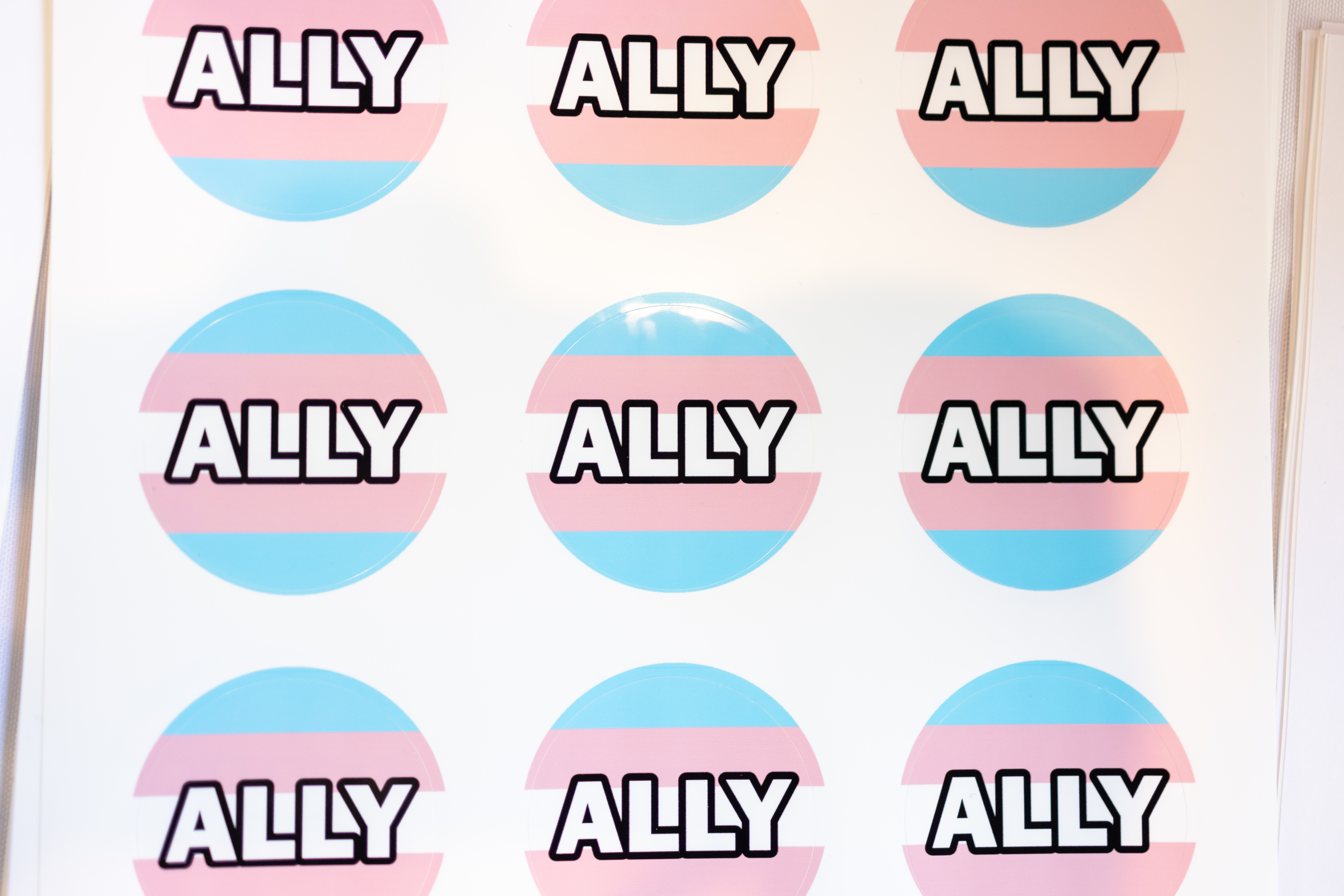Transgender Day of Visibility Celebration Returns
to Santa Barbara
Santa Barbara Transgender Advocacy Network
Hosts Fifth Annual Event
at Unitarian Society on Saturday
by Callie Fausey | Photos by Ingrid Bostrom
April 4, 2023

When Kathy Abad’s son came out to her as transgender when he was 14, she didn’t know what to do. It’s not like there was a handbook, or many accessible examples to follow, about how to be a parent to a transgender kid. And there certainly were no local events specifically dedicated to a day of trans visibility, like the one that was just celebrated this weekend.
“We just didn’t know anything,” Abad said. “It felt like I was the only person in the world who had trans kids: really isolating, lonely, and powerless.”

But she and her husband wanted to learn. They turned to PFLAG Santa Barbara, a nonprofit advocacy and support group for parents, families, and friends of lesbian, gay, bisexual, and transgender persons. During the first PFLAG meeting Abad attended eight years ago, she was introduced to three other parents of trans kids.
From there, they formed the Santa Barbara Transgender Advocacy Network (SBTAN), a support group specifically for families of trans youth in Santa Barbara. Abad said that it’s important for parents to educate themselves so they can understand how to move through the transitioning process with their children, which is different for everyone.
“Then when I started learning, and my husband started learning, kind of going brick by brick through, like, what it means to be trans and really accepting it … there was just this power that came over within months,” Abad said, describing her own transformation into a “fierce parent” who advocates for her child.
“I mean, it was little things like going to the store, and people saying, ‘Oh, how is your son and daughter?’ and I’m like, ‘Oh, actually, I have two kids. They’re both boys. My oldest son is now trans. Anyways, how are you doing?’”
Over the past eight years, the SBTAN support group has grown and now includes trans-affirming training for organizations and schools throughout the tri-county area; its Santa Barbara Transgender Center, Lisa’s Place; and various local events.

In 2016, SBTAN held the county’s first-ever recognized celebration of Transgender Day of Visibility (TDOV), which is internationally recognized on March 31. On Saturday, April 1, they celebrated their fifth TDOV event at the Unitarian Society of Santa Barbara, surrounded by the pastel blues and pinks of the trans flag; an exhibit featuring artwork by Santa Barbara–based trans, nonbinary, and gender-nonconforming artists; and tables providing resources and information from PFLAG and Planned Parenthood.
SBTAN’s Executive Board President Lillian Simmons explained that the Transgender Day of Visibility is sort of the “flip side” of the Transgender Day of Remembrance, which is a day to recognize and memorialize trans people whose lives were lost in acts of transphobic violence.
“But the trans experience is not just about death,” Simmons said. “The trans experience is about life; it’s about vibrancy; it’s about joy.”
One artfully crafted multimedia book on display in the art exhibit was The Name Monster by UCSB art student Parker Graham. The book portrays the anxiety, frustration, and sadness that comes with people referring to an individual by their deadname (the name they used before transitioning), rather than their adopted name, through attributing their deadname to a kind of monster that follows them in their daily life.
Simmons explained that as trans youth work through their own feelings that come with transitioning, it’s important for parents to be an understanding and supportive figure in their lives, which is a primary reason why SBTAN was so helpful for her.
“Parents have a lot of emotions about what’s happening,” Simmons said. “And it’s so helpful to be able to say those feelings to someone else who’s an adult, and who understands, as opposed to trying to process it with your child, because your child is the only person who knows this fact, you know, but not someone that should be processing all of their parents’ emotions.”
The Unitarian Society was set up as a safe and celebratory space for trans and nonbinary individuals, families, and allies on Saturday, and a “love crew” of members of the congregation positioned around the venue to protect the roughly 50 people in attendance.
“I think that it does tend to be surprising to people … how many trans or nonbinary people exist in the world,” Simmons said. “It changes when it’s someone that you know, when it’s someone that you love; it becomes very personal. It’s a very different thing. You see things differently.”
Simmons’s child is nonbinary, and she explained that once they came out, she started to notice that “every form didn’t have a third box.”

“And I literally can’t fill out the paperwork for my child, because it does not describe who they are. I think that when your eyes are opened, you see it everywhere, and you really start to understand.”
Stephen Mitchell, a PFLAG boardmember, explained that promoting and supporting trans visibility, as well as safety, is crucial, especially in the wake of a pride flag theft and burning in the Santa Ynez Valley, rainbow-colored crosswalks painted over at Santa Ynez High School, the rejection of pride banners in Solvang, and the rise of anti-transgender discrimination and rhetoric nationally following a shooting at a Nashville Christian school on March 27.

Mitchell said he is the father of one transgender 19-year-old and a nonbinary 15-year-old. He came from a conservative family in Phoenix, Arizona, and any exposure to the LGBTQ community he had in the past had been shown in a primarily negative light.
Like Abad, Mitchell wanted to support his kids but didn’t know how. Through meeting other parents going through the same thing, he said he was able to learn how to be an advocate and ally for his children in the face of family members who didn’t understand.
“The best way I can help my kids and their future is to educate other people about them,” Mitchell said. “And that’s our whole model. Just trying to get other parents to understand it’s not a ‘death sentence’; it needs to be something that you work at and grow at and advocate for and educate people on so that ignorance goes away.”
Eight years after SBTAN’s founding, Abad’s son is now 23. Since he first came out at 14, he and his mom have had both a shared and individual journey in navigating their parent-child relationship.
“Once parents use the right pronouns, let them cut their hair, let them dress the way they want, let them use the chosen name that they want,” Abad said, “within a month or two, parents come back, and they say, ‘Oh my gosh, like, my kid has done a 180.’ Like, let’s just just see how it feels for your kiddo. And then that’s when they just kind of start, you know, really flourishing.”




You must be logged in to post a comment.